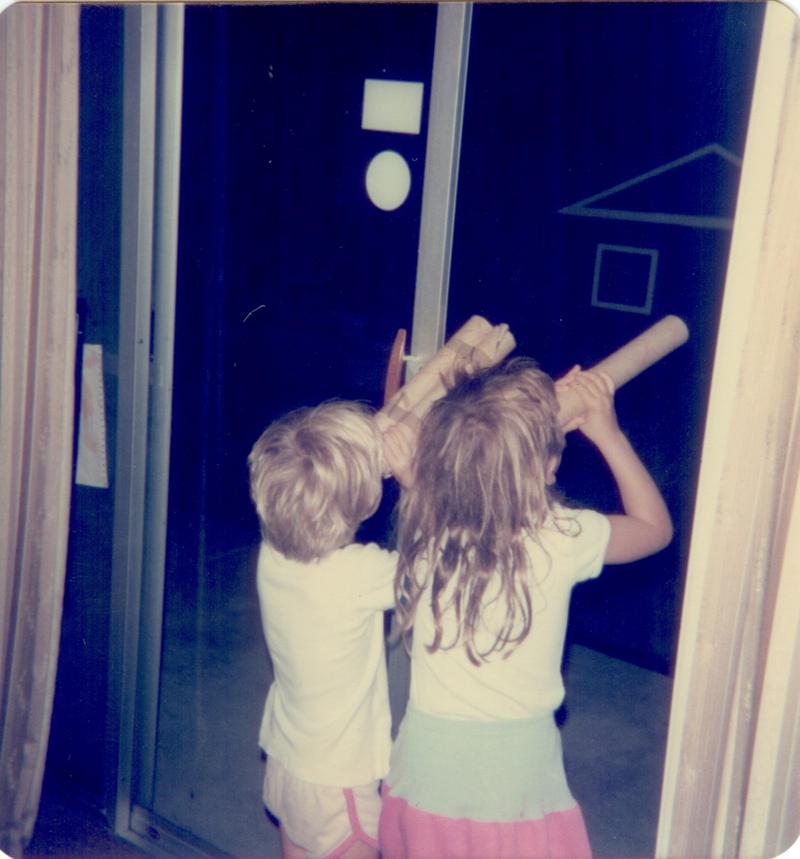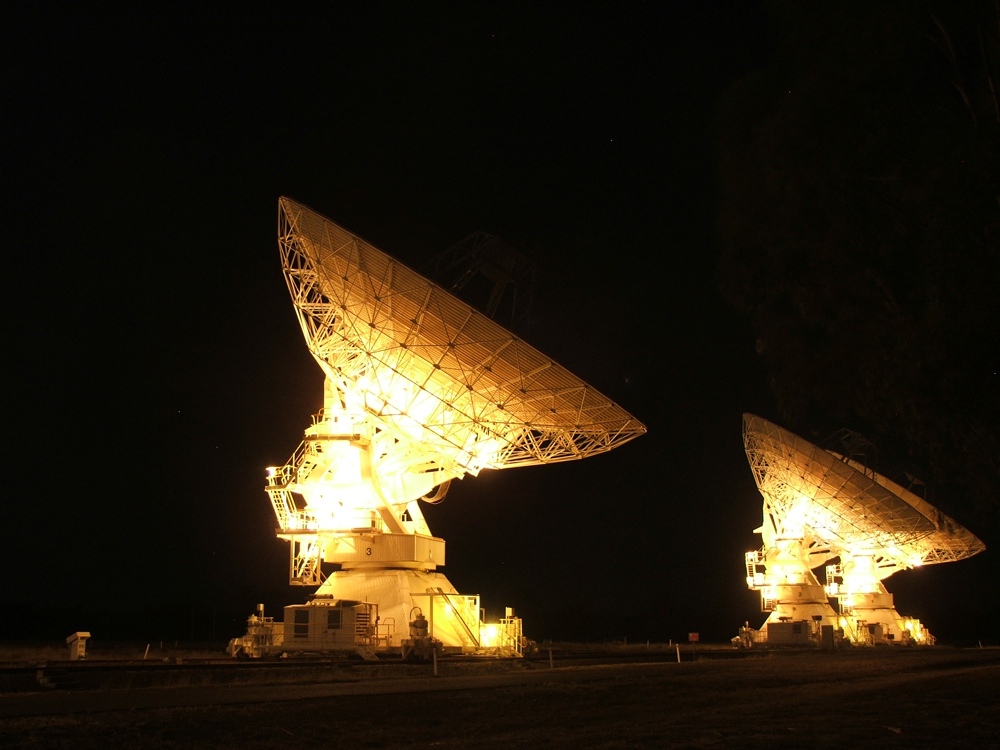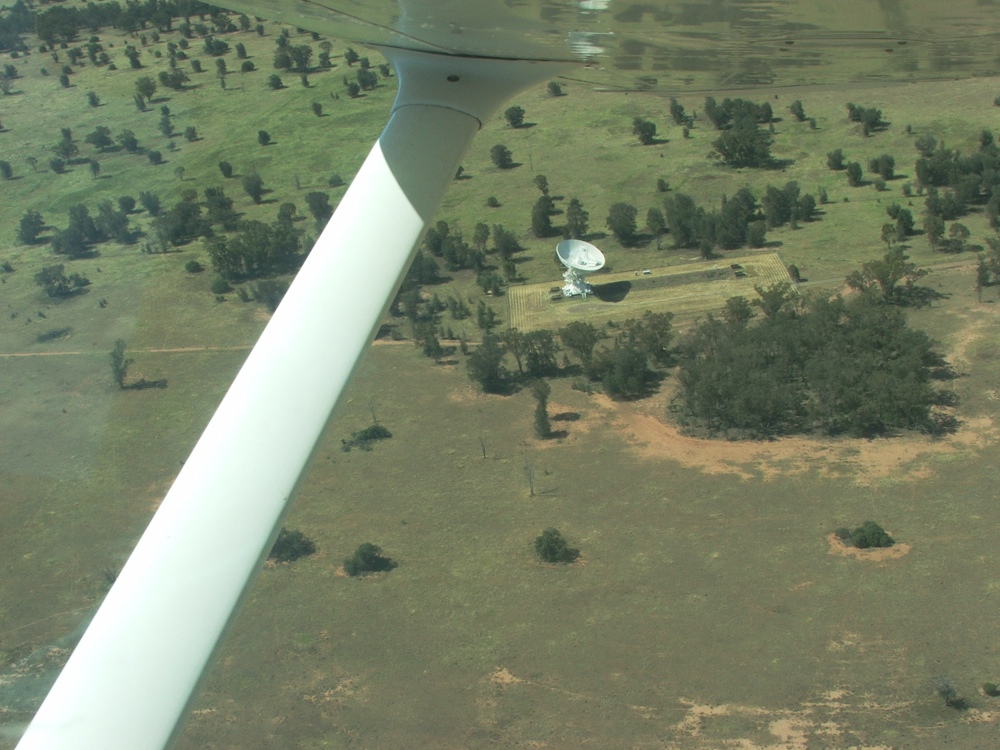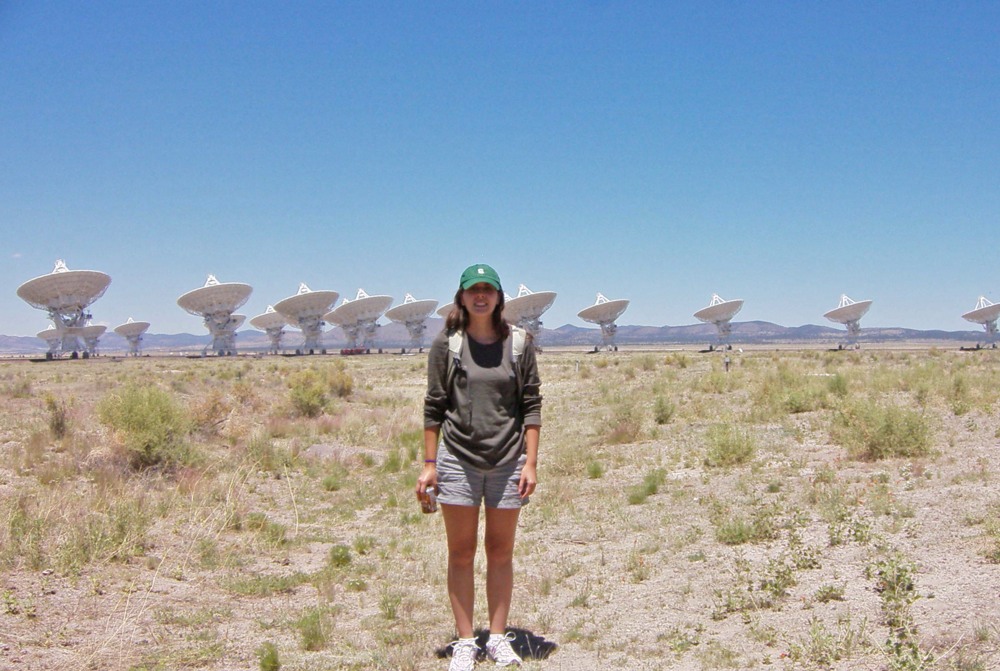Today’s post is written by Tui Britton, a PhD student at Macquarie University and co-supervised at CSIRO Astronomy and Space Science.
I conducted my first astronomical observation at the age of 6 from my parents’ backyard in New Zealand. I witnessed the passage of Halley’s comet through a homemade telescope – the cardboard centre from a paper towel roll! Since then I have come a long way.
My first astronomical observation in 1986. I’m on the right, my brother is on the left. Photo by Dr. Graeme Britton.
My first astronomical observation in 1986. I’m on the right, my brother is on the left. Photo by Dr. Graeme Britton.
I now use Australia’s largest radio telescope, the Australia Telescope Compact Array, to study our galaxy. I use masers – the microwave analogue of lasers – to probe star forming regions in order to understand the origins of the most massive stars in our galaxy.
Being a PhD student at Macquarie University and affiliated with CSIRO Astronomy & Space Science, here in Sydney, has its benefits. I have access to Australia’s largest radio telescopes and received financial support to attend workshops and conferences, both nationally and overseas.
My favourite telescope – ATCA – lit up at night. Photo by Tui Britton.
My favourite telescope – ATCA – lit up at night. Photo by Tui Britton.
I often travel for observations and to attend conferences. These opportunities have increased my network of peers, exposed me to new scientific and observing techniques, raised my awareness of career opportunities, and allowed me to present my research to the international astronomical community.
Along the way I have learnt what resources and skills I need to complete my PhD effectively. I have also learnt what doesn’t work and identified issues that can arise with colleagues, advisors, funding, and technology. I’ve also learnt second hand from my fellow students some of their trials and tribulations. What I provide below is a list of my top 10 tips for being a PhD student in astronomy.
So if you are considering pursuing a Masters or PhD, or are currently a (post-) graduate student, then here is my advice to you:
1. Do what you really want to do!
Choose a topic that you are interested in and want to know more about. I was doing a Masters in exoplanets when I was awarded a Summer Vacation Scholarship at CASS. This was the first time I was introduced to radio astronomy. I found it a lot more interesting than optical astronomy so I decided to make the switch for my PhD. There’s no point in doing a PhD in an area you dislike or don’t care about. Seriously only consider doing a Masters or PhD in astronomy if it is really what you want to do!
2. Narrow your focus early on!
I was actively involved in 18 astronomical observing projects in the field of star formation for the first two years of my PhD. This was way too many to be able to finish within a decent timeframe. My work progressed more quickly when I narrowed my research down to one observing project – a survey of methanol masers in massive star formation. I was able to focus on the tasks needed to complete observations, reduce data, and analyse my results. While it is good to explore options and gain a broad set of technical skills (especially as an observer), you need to make sure you don’t take on too much. Your PhD is usually only 4 years, so you will be better off knowing earlier on what your intended project should be.
3. Choose your advisor(s) wisely.
Select someone who actively engages with you and is willing to help you learn. I chose to continue working with my CASS advisor from my summer scholarship. I chose a university advisor who was willing to support the project I was already working on and my collaboration with CASS. This helped me to steer my PhD in the direction I wanted and continue working with the people at CASS whom I was comfortable with. If you want to have some fun, choose an advisor who’s also a pilot. There’s no better way to get to a workshop on time than to be flown personally in a Cessna. Also great for aerial views of your favourite telescope!*
*Thanks Max!
Aerial view of antenna 6 (ATCA). Thanks Max! Photo by Tui Britton.
Aerial view of antenna 6 (ATCA). Thanks Max! Photo by Tui Britton.
4. Actively manage your advisor(s).
It can be difficult having several advisors who work at different institutes like I have. You can spend a lot of time travelling between the institutes and your workload can get messy if you have advisors with different priorities. If they aren’t offering enough support or guidance, then ask that they meet with you on a regular basis. I did this with my university advisor when I was getting overwhelmed with my 18 projects. By asking him to help me narrow down my topic we both were able to make sure I wasn’t getting sidetracked. Also by regular meetings with my CASS advisor I was able to go to him for technical help regarding my data. Each advisor has a different knowledge set and skills, so it is useful to initially meet each regularly so you can gain insight from their input.
5. Collaborate! Collaborate! Collaborate!
When possible try to join an established research team. The benefit with CASS is that there are several different research teams in the one place! And a lot of the astronomers are part of larger international research teams. I was able to join several of these international collaborations (HOPS and MALT90). This improved my professional network, giving me a larger number of people with whom to collaborate. And also a larger number of people with whom I could ask for advice regarding my PhD. CASS gave me access to colleagues at different stages in their careers i.e. fellow students, post-docs, and tenured academics. I’ve received a lot of advice on how to manage my career and some of the pitfalls to look out for from my senior colleagues.
6. Select a suitable institute.
Ideally, you want to work and study at one of the top institutes in your research area. CASS is the leading radio astronomy institute in Australia, so I have benefited enormously by affiliating with them at such an early stage in my career. CASS offers travel funding for an international conference and publishing funds for page fees. I chose to do my PhD at Macquarie University, which offers a limited budget each year to students to spend on equipment or conference/workshop travel. If your chosen university doesn’t offer funds then check with your potential advisor. I know students at University of Sydney often rely on their advisor for travel funding. If you are an observer, then choose an institute that has access to telescopes. If you are a theorist then having access to supercomputers, such as those at Swinburne University of Technology, may benefit you.
7. Apply for external grants.
Most PhD stipends don’t pay much so it is likely you will need further financial assistance. This may be in the form of a top-up grant to supplement your living stipend or conference travel. Look for organisations that will provide funds for your area of research and apply for them! You will lose nothing by trying. Astronomy institutes that I have been awarded grants from are: International Astronomical Union, Astronomical Society of Australia (ASA), and the American Astronomical Society. If you are successful then you can add successful grant writer to your CV or resume, which is worth a lot when looking for jobs!
8. Attend workshops and conferences!
Try to attend at least one national and one international conference or workshop. These allow you to meet fellow students from different countries and increase your network base. You’ll also learn new skills and broaden your knowledge. There are many astronomy schools around the work lasting from a few days to several weeks. I recommend that you attend at least one astronomy school. This could cater to your particular wavelength or your particular chosen telescope i.e. Parkes Single Dish Radio School.
Conferences also give you an opportunity to present your work to your peers. This is necessary in order for people to take you seriously as a researcher and also gives others an opportunity to provide feedback on your work. The ASA has a conference every year, which is a great way to meet other Australian astronomers. This is usually preceded by the Harley Wood Winter School, which caters for PhD students.
Me at the VLA in New Mexico, USA. Photo by Dr. Mar Mezcua.
Me at the VLA in New Mexico, USA. Photo by Dr. Mar Mezcua.
9. Actively present your research!
Regularly try to give talks to the public and other academics outside your area of expertise. This will increase you communication skills, another important skill to add to your CV! By actively engaging others in your research, you will not only boost your confidence, but also promote your research to a broader audience.
10. Procrastinate proactively!
There will be times when you are so sick of your PhD that you never want to see another spectral line ever again. This is ok and normal! Take a break. Write some of your thesis or read some papers outside your research area. Teach a couple of labs or introductory astronomy classes. You could even do a post on this blog! Do something that is not directly related to your PhD research but still supports your career in astronomy.
Tui will be posting an article about her specific research on masers at a later date. F.ind out more CSIRO Astronomy and Space Science’s Graduate Student program.





